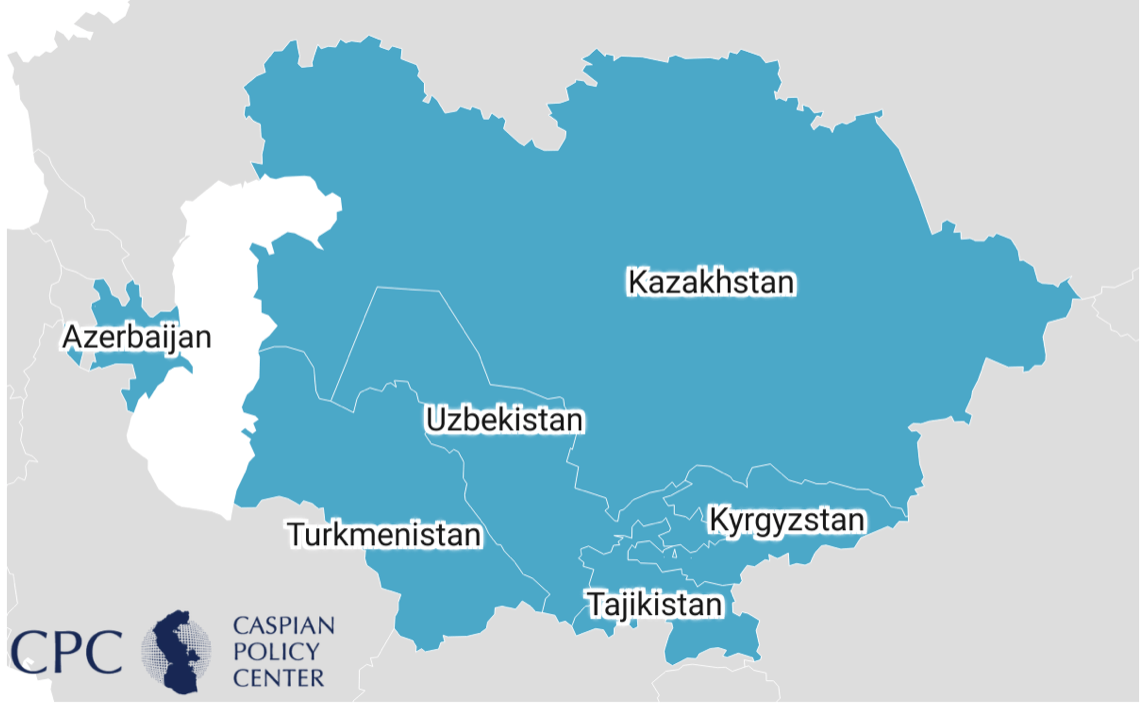C5+1=C6: In the Words of the Presidents
Recent Articles
Author: Toghrul Ali, Kurtis Yan, Lilly Horrigan, Zhanel Sabirova
11/18/2025
The Seventh Consultative Meeting of the Heads of State of Central Asia took place in Tashkent, Uzbekistan, November 16. The parties discussed avenues to enhance regional cooperation, increase trade turnover, and become a more unified bloc. Individual leaders also met on the sidelines and signed agreements to further cooperation, such as $1.3 billion in new projects between Kazakhstan and Uzbekistan. That said, perhaps the most notable outcome of the meeting was the formal integration of Azerbaijan into the Consultative Meetings platform, ensuring its full-member participation in the format’s gatherings going forward.
As the host president of this meeting, Uzbekistan President Shavkat Mirziyoyev opened the multilateral discussion by congratulating Azerbaijan for its ascension into the C5 format. He welcomed the integration’s alignment with “shared history” and praised the move as a step forward to “build a strong bridge between Central Asia and the South Caucasus” and enhance connectivity across the Caspian Sea. Mirziyoyev stressed the importance of strengthening regional integration on multiple fronts. He proposed the creation of a “Community of Central Asia” bloc, with the goal of transforming the consultative format into a strategic bloc.
President of Azerbaijan Ilham Aliyev thanked Shavkat Mirziyoyev for the invitation and for his traditional hospitality. He highlighted that this year marked Azerbaijan’s third consecutive participation in the Consultative Meetings of the Heads of Central Asia, following earlier engagements in Tajikistan and Kazakhstan, underscoring Baku’s growing commitment to regional dialogue and cooperation. Aliyev also noted that over the past three years he has made 14 visits to Central Asia, while leaders from the region have traveled to Azerbaijan 23 times. This level of engagement, he emphasized, demonstrates that although Azerbaijan is geographically part of the South Caucasus, its active and sustained interaction with Central Asian states has effectively shaped a “single geopolitical and geo-economic region whose global significance is steadily increasing.” Aliyev also noted the strategic importance of the Middle Corridor, describing Azerbaijan and Central Asia as a crucial connectivity bridge between East and West. In this line, he affirmed that the development of the Zangezur Corridor (also known as the Trump Route for International Peace and Prosperity [TRIPP]), within the framework of the agreements reached in Washington in August, will further enhance the transit potential of the region.
Kazakhstan’s President Kassym-Jomart Tokayev in his speech stated that the era of isolationism and closed borders is no longer associated with the region. Having mentioned the examples of current expanding economic cooperation between countries, Tokayev pointed out new projects and areas, such as high-tech development of agriculture and enlarging logistics storage, should be included to increase international attention to the region. He also proposed establishing a regional research center for rare earth metals in Astana and drafting a Central Asian declaration on the responsible and transparent use of AI technologies.
President of Kyrgyzstan Sadyr Japarov stressed that further deepening of integration should prioritize several aspects: prosperous export and import relations will increase with diminished trade barriers and harmonized legal and technical regulations; develop specific joint production chains and new industrial clusters; and utilize digitalization as a catalyst for growth. About the development of transport infrastructure, Japarov emphasized the critical role of the China-Kyrgyzstan-Uzbekistan railway and highlighted TRIPP Route between Azerbaijan and Armenia as a strategic continuation of the railway in the Middle Corridor. To improve transport efficiency, he also proposed launching a unified electronic platform, “Digital Transit Corridor,” for the exchange of customs data.
Like other leaders, Tajikistan’s President Emomali Rahmon expressed his support for expanding the C5 format to include Azerbaijan. He stressed the importance of regional dialogue to advance development and transit cooperation and proposed creating a unified Central Asian transport and logistics space. Highlighting the opportunities presented by artificial intelligence (AI), Rahmon also called for stronger regional cooperation on digitizing economies and implementing AI, including a proposed Regional Artificial Intelligence Center in Dushanbe. He later identified regional security and stability as top priorities for Tajikistan and noted that terrorism, extremism, cybercrime, and drug trafficking remain primary concerns. Rahmon suggested expanding cooperation on professional training in the security and cybersecurity sectors to address these threats.
 Having congratulated President Aliyev on Azerbaijan’s accession to the C5 format, President of Turkmenistan Serdar Berdimuhamedov called for strengthening economic cooperation across the region, highlighting transport, energy, trade, and environmental collaboration. He stressed the importance of regional cooperation on logistics and transport infrastructure to secure trade routes, especially as Central Asia gains international recognition as a key transport corridor. Turning to energy, Berdimuhamedov noted that Turkmenistan is ready to deepen its energy partnerships in both electricity and hydrocarbon pipelines. He also underscored Turkmenistan’s continued cooperation across the region on water and environmental issues.
Having congratulated President Aliyev on Azerbaijan’s accession to the C5 format, President of Turkmenistan Serdar Berdimuhamedov called for strengthening economic cooperation across the region, highlighting transport, energy, trade, and environmental collaboration. He stressed the importance of regional cooperation on logistics and transport infrastructure to secure trade routes, especially as Central Asia gains international recognition as a key transport corridor. Turning to energy, Berdimuhamedov noted that Turkmenistan is ready to deepen its energy partnerships in both electricity and hydrocarbon pipelines. He also underscored Turkmenistan’s continued cooperation across the region on water and environmental issues.
With the recent C5+1 Presidential Summit in Washington, now followed by the Consultative Meeting of the Heads of State of Central Asia, the region has further emerged as a globally recognized center of political cohesion and economic promise. Leveraging its strategic geographic position as a key transit hub and its abundance of critical resources, Central Asia is not only attracting renewed attention from Western partners but also demonstrating a clear commitment to strengthening its role on the international stage—most notably by expanding to include an important new member.